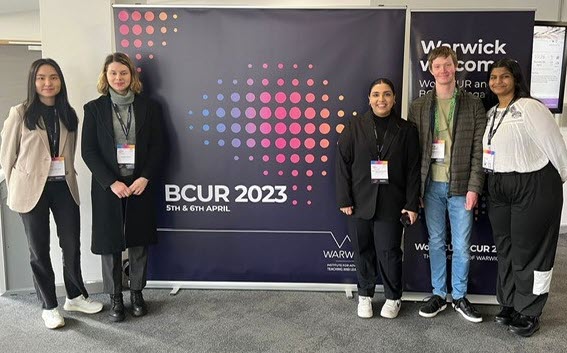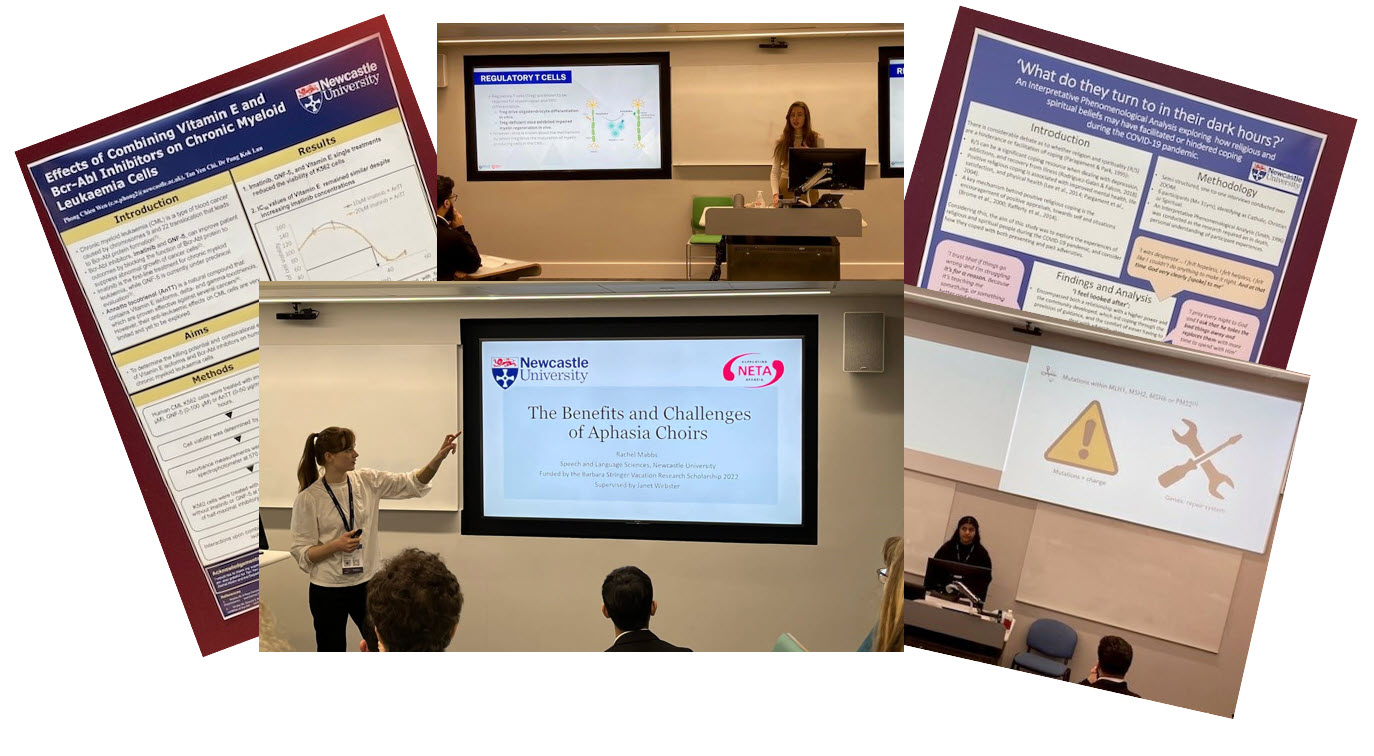BCUR events
BCUR 2024

In 2024 the BCUR took place at the London School of Economics and Political Science (LSE) on 25-26 April 2024, which brought hundreds of students from across the UK together to meet, share their research and make new and exciting connections.
If you are interested in applying for a Newcastle University scholarship to cover the costs of attending the event, you can find all the information you need below.
Good luck!
Please make sure you read all instructions carefully before submitting your application.
What a fantastic BCUR event hosted by LSE!
We had 31 representatives from across Newcastle University and what detailed and inspiring presentations they gave. We provided eight funded scholarships to attend BCUR 2024 and each student presented professionally, engaged with other presentations and throughout the conference. It was a pleasure to attend and observe their work, well done all, you did Newcastle University proud!
Overall, there were 215 presentations, 109 poster presentations from undergraduate students from across the UK. The keynote speaker, Dr Grace Lorden, helped to create a buzz of excitement amongst conference attendees that spilled out throughout the day and into the poster sessions where students listened to each other present and asked questions about their research. LSE were exceptional hosts and for those who attended the conference dinner, we were welcomed into the ‘Old building’ of LSE which had history and charm.
It was both exciting and inspiring to see the future research leaders present, it makes me positive for the future!
Well done all and we look forward to hosting you at Newcastle for BCUR 2025!
Below you can read some enthusiastic testimonials from students who participated in the event this year.
"Within this group there were two more presentations.
1. ‘Sort your life out! Are contemporary discoursed of domestic decluttering repeating gendered and normative ideals narratives from previous centuries and reframing them to make them acceptable to contemporary audiences?’
- This presentation was about clutter from the University of Leeds. It was very interesting, and her research methods were different to my research project. She analysed the TV program ‘Sort Your Life Out’ and then compared the attitudes towards clutter with Victorian books about women and the home.
- Results showed similarities between the domestic decluttering in both the 19th and 21st century. However, differences between the gender ideals in domestic homes in the TV show were more equal and less focused on women. Research showed that women were no longer stereotyped as the gender who is guilty of clutter.
- They felt that further research could be conducted into mental health and clutter.
- This research was quantitative and used big data to analyse the reviews at hotels with robots. It was very well analysed and came up with an interesting result
- On different continents the results differed with the US scoring robot hotels lower than Europe and Asia.
- It was very informative and something I have never thought about before."
- Georgia Hughes
“Attending the British Conference for Undergraduate Research was an enlightening experience that truly displayed the abilities of academic exploration among my peers. I attended presentations on topics ranging from psychology to quantum physics, and interacted with a lot of student researchers that were displaying their research on posters. The conference provided a platform for new researchers like myself to present our findings, exchange insights, and receive constructive feedback from peers and experts in various fields. Beyond the presentations, the event was the perfect opportunity for networking. Engaging in discussions with fellow attendees, from universities from all over the UK, allowed me to gain valuable contacts and broaden my perspective. Overall, it was not just a showcase of academic achievement but also a testament to the power of collaboration and the importance of networking in the research community.”
- Konstantina Angelopoulou
"At the end of April, I had the opportunity to travel to London to the BCUR conference that was hosted by the London School of Economics and Political Science. I was lucky to have been awarded a scholarship to attend the conference by Newcastle University alongside seven brilliant students and am extremely grateful for the experience it granted me. We saw student presentations on a variety of fascinating topics, ranging from quantum computers or the distribution of generic medicines in India to Native American land conservation and speech therapy protocols in the NHS. The BCUR trip was an amazing trip that allowed me to display my research to a whole new crowd of nearly 400 attendees as well as meet many like-minded students from Newcastle and many other UK universities – as well as attend talks delivered by widely recognised academics. All in all, it was a academically and personally enriching experience that I highly recommend other students to apply to!"
- Megan Groves
“I was incredibly grateful to have been chosen by Newcastle University to represent them at this year’s British Conference of Undergraduate Research, with my research titled ‘From TikTok to Transcendence: An Investigation into the Characteristics of Religion and Spirituality in Generation Z’. Being from the North-West of England going to university in the North-East of England, I rarely get the opportunity to visit the capital, so I was very excited to be visiting LSE in London. I was able to meet students from all over the country, as well as connect with other Newcastle students. I maximised my free time in the city, using my lunch breaks and evenings to explore the National Gallery and attending a show at a theatre just 5 minutes around the corner from the campus. I’d like to thank Newcastle University for organising our travel and accommodation, as well as expensing other parts of the trip. I'd also like to thank LSE for hosting the event and looking after us all so well. I would strongly recommend everyone to attend next year, which will be held on our campus!”
- Mia Williams
BCUR 2023 - 5-6 April - University of Warwick

The 2023 BCUR conference was hosted by Warwick University and for the first time also included the World Congress on Undergraduate Research (WorldCUR) and the joint event ran over 3 days from 4-6 April 2023.
The Newcastle University BCUR scholarship competition selected 12 students to represent the University. You can read the extracts they submitted on our Student Research pages.

Newcastle University students attending the BCUR 2023 event in Warwick
The students were supported by Vanessa Armstrong, Lecturer in Biomedical, Nutritional and Sports Sciences, and a member of the BCUR Newcastle Organising Team, who accompanied them down to Warwick on the train. Students have the option to present either a poster or presentation of their work at BCUR, and there was an equal mix of six presentations and six posters. On 5 April 2023 there was a Gala Dinner for delegates of both WorldCUR and BCUR, and the keynote speech, entitled 'How to Not Fall Flat: Communicating Research to Different Audiences' was delivered by Professor Sir David Spiegelhalter, Chair of the Winton Centre for Risk and Evidence Communication in the Centre for Mathematical Sciences at the University of Cambridge.
Over the two days of the conference our students presented their posters or delivered their presentations to the other delegates.

A selection of the posters and presentations by Newcastle University students
The conference was a great opportunity to meet and students from universities across the UK and the world, to network and share ideas and research projects. Two of our students, Andrew Davidson and Rashi Krishna have written about their experiences of the conference, and you can read these on our Hear from Students page.


